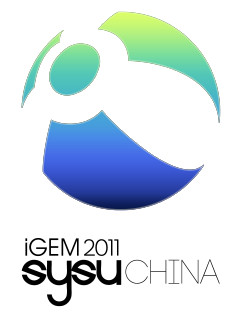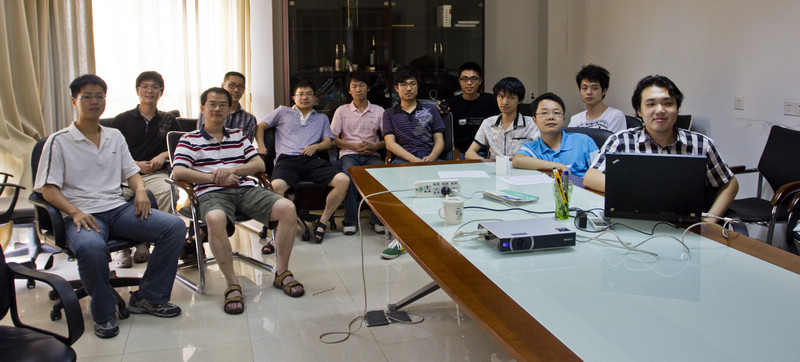Team:SYSU-China
From 2011.igem.org
| Line 2: | Line 2: | ||
<p>'''The Project'''</p> | <p>'''The Project'''</p> | ||
| - | <p> The nuclear-leakage issue in Japan has caught world-wide attention this year. With the difficulty to clean the nuclear fuel leaked after emergency, this issue has caused huge environmental problems. With the wish to deal with or even eliminate these problems both for this time and in the future, we spared no effort to design our engineered <em>E. | + | <p> The nuclear-leakage issue in Japan has caught world-wide attention this year. With the difficulty to clean the nuclear fuel leaked after emergency, this issue has caused huge environmental problems. With the wish to deal with or even eliminate these problems both for this time and in the future, we spared no effort to design our engineered <em>E. coli </em>nuclear-cleaner.<br /> <br> |
| - | Our approach to achieve that goal has two steps. First, we'll build chemotaxis to Ionising radiation into our engineered bacteria so that they'll be able to move towards seriously affected places. The radiation-sensitive promoter <em>PrecA</em> and the gene <em>CheZ</em> will help us accomplish that. Second, when moved in a proper radiation level, <em>E. | + | Our approach to achieve that goal has two steps. First, we'll build chemotaxis to Ionising radiation into our engineered bacteria so that they'll be able to move towards seriously affected places. The radiation-sensitive promoter <em>PrecA</em> and the gene <em>CheZ</em> will help us accomplish that. Second, when moved in a proper radiation level, <em>E. coli</em> could on one hand start to absorb <sup>137</sup> Cs<sup>+</sup> and on the other hand aggregates with other <em>E. coli</em>, forming sediment and making it much easier to collect and clean manually. The less radiation-sensitive promoter <em>PrecN</em>, gene <em>trkD</em>, which helps to deal with the Cs<sup>+</sup> ions, and gene <em>ag43</em>, which handles the aggregation work, help us to realize this step. Besides, some unknown areas are to be elucidated, such as disturbance of usual environment, sensitivity of promoter, interaction between environment and inner reaction in <em>E. coli</em>.<br> <br /> |
With all these effort, our nuclear cleaner will become capable and accomplished in dealing with the nuclear-leakage issue. Moreover, this model is supposed to be capable to absorb other radiation ions like <sup>131</sup> I<sup>-</sup> and <sup>60</sup>Co<sup>+</sup> with the aid of the gene of other ion channels. We are sure that our happy work this summer will contribute greatly to the ultimate goal of this project – to clean all kinds of leaked nuclear pollutant and reward people a better life.</p> | With all these effort, our nuclear cleaner will become capable and accomplished in dealing with the nuclear-leakage issue. Moreover, this model is supposed to be capable to absorb other radiation ions like <sup>131</sup> I<sup>-</sup> and <sup>60</sup>Co<sup>+</sup> with the aid of the gene of other ion channels. We are sure that our happy work this summer will contribute greatly to the ultimate goal of this project – to clean all kinds of leaked nuclear pollutant and reward people a better life.</p> | ||
<p><br> | <p><br> | ||
Revision as of 18:42, 2 September 2011
The Project
The nuclear-leakage issue in Japan has caught world-wide attention this year. With the difficulty to clean the nuclear fuel leaked after emergency, this issue has caused huge environmental problems. With the wish to deal with or even eliminate these problems both for this time and in the future, we spared no effort to design our engineered E. coli nuclear-cleaner.
Our approach to achieve that goal has two steps. First, we'll build chemotaxis to Ionising radiation into our engineered bacteria so that they'll be able to move towards seriously affected places. The radiation-sensitive promoter PrecA and the gene CheZ will help us accomplish that. Second, when moved in a proper radiation level, E. coli could on one hand start to absorb 137 Cs+ and on the other hand aggregates with other E. coli, forming sediment and making it much easier to collect and clean manually. The less radiation-sensitive promoter PrecN, gene trkD, which helps to deal with the Cs+ ions, and gene ag43, which handles the aggregation work, help us to realize this step. Besides, some unknown areas are to be elucidated, such as disturbance of usual environment, sensitivity of promoter, interaction between environment and inner reaction in E. coli.
With all these effort, our nuclear cleaner will become capable and accomplished in dealing with the nuclear-leakage issue. Moreover, this model is supposed to be capable to absorb other radiation ions like 131 I- and 60Co+ with the aid of the gene of other ion channels. We are sure that our happy work this summer will contribute greatly to the ultimate goal of this project – to clean all kinds of leaked nuclear pollutant and reward people a better life.
The Team
It is the first time that we Sun Yat-sen University take part in the competition. We spare no effort to bring you some new ideas and make a difference. Here's a photograph of our team members below.
| Home | Team | Official Team Profile | Project | Parts Submitted to the Registry | Modeling | Notebook | Safety | Attributions |
|---|
 "
"

